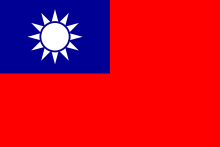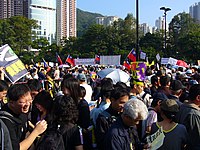Pro-Republic of China
Many of these have negative views on the PRC's mainland China rule and support the Chinese unification under ROC.
[citation needed] Some dissident pro-democracy activists expressed their admiration for the post-reform liberal democratic ROC political system and formed illegal pro-ROC organizations under PRC rule.
[6] However, with the implementation of the 2020 Hong Kong national security law, many pro-ROC organizations are severely suppressed.
Sankei president Shikanai Nobutaka [zh] funded the construction of the Chiang Kai-shek Memorial Hall.
[10] The Japan–ROC Cooperation Committee (⽇華協⼒委員会; Nikka Kyōryoku Iinkai, JRCC) was established in 1957 with the support of the Republic of China government to promote cooperation between Japan and the Republic of China (Taiwan) in political, economic, and cultural fields; it was associated with pro-ROC Liberal Democratic Party politicians.
The World League for Freedom and Democracy, an international anti-communist organization founded by Chiang in 1952, featured Japanese ultranationalists such as Ryōichi Sasakawa and Yoshio Kodama.

